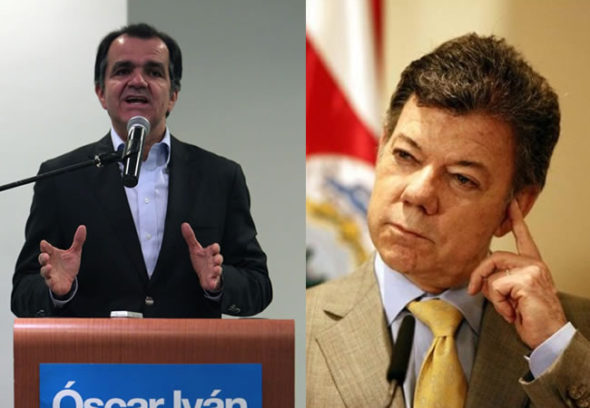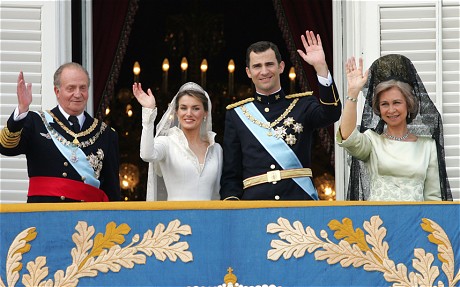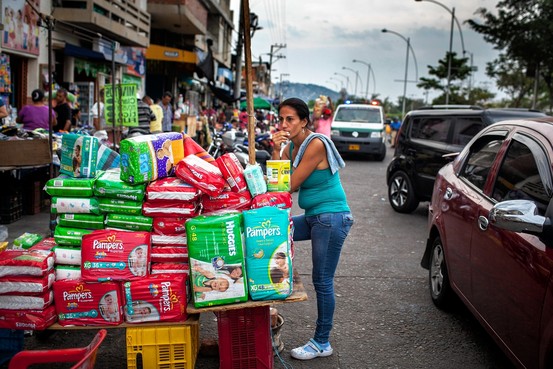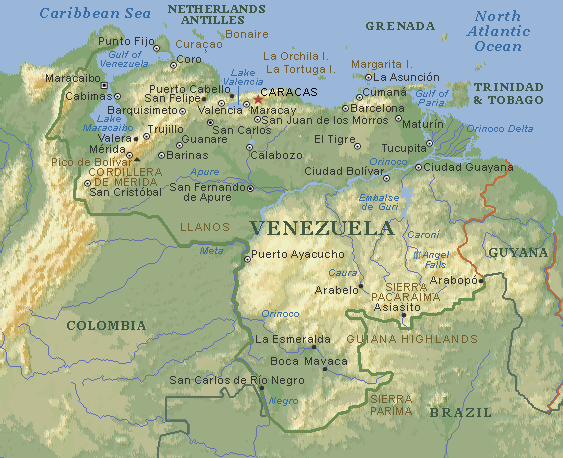News from Colombia, Spain and Venezuela
Tuesday's World Events — Posted on June 10, 2014
COLOMBIA – FARC declares cease-fire for election period
BOGOTA – Colombia’s leftist FARC rebels declared a ceasefire on Saturday from June 9 to 30, a period that will cover a run-off presidential election being contested mainly over how to end five decades of war with the guerrillas.
The three-week ceasefire was announced in an open letter posted on the group’s website and written to right-wing presidential candidate Oscar Ivan Zuluaga who has been skeptical about peace talks with the group begun by his rival and incumbent President Juan Manuel Santos.

Presidential candidate Oscar Ivan Zuluaga (left) and incumbent President Juan Manuel Santos (right).
“We want to tell the country, through you (Zuluaga), our decision to declare another unilateral ceasefire for the occasion of the second round of elections to the Presidency of the Republic,” said the letter signed by FARC leader Timoleon Jimenez, known as Timochenko.
 Zuluaga is the anointed candidate of popular ex-president Alvaro Uribe, who led an unprecedented U.S.-backed military assault against the FARC that is estimated to have halved their ranks to around 8,000.
Zuluaga is the anointed candidate of popular ex-president Alvaro Uribe, who led an unprecedented U.S.-backed military assault against the FARC that is estimated to have halved their ranks to around 8,000.
President Santos began negotiations with the FARC in the Cuban capital Havana in late 2012 with an agenda now roughly half complete. The FARC are still combating government troops in their rural hideouts, having rejected a unilateral ceasefire unless the government reciprocates.
Nonetheless, the FARC declared a week-long ceasefire around the period covering the first round of elections on May 25 in which Zuluaga won most the most votes of any candidate but fell far short of the 50 percent of votes needed to avoid a run-off.
Three voter polls on Thursday and Friday showed the second round vote between Zuluaga and Santos will be very tight. A Gallup poll said the two were in a dead heat while two others gave a solid lead to one candidate or the other.
The election campaign has largely divided voters between those who back Santos to give him a chance to complete the peace talks and Zuluaga supporters who are more doubtful that the rebels will disarm and walk away from the lucrative drug trade they control even if a deal is signed.
SPAIN – King Juan Carlos abdicates throne in favor of his son
King Juan Carlos of Spain told courtiers that he wanted to abdicate in favor of his son because he did not want his heir to “grow old waiting for the throne like [Britain’s] Prince Charles.”
The 76-year-old monarch, who announced last Monday that it was time for “a younger generation to step into the front line,” is said to have been influenced in his decision to abdicate by the situation of the Prince of Wales, who at 65 is the oldest heir to the British throne for 300 years.

From left, King Juan Carlos, Princess Letizia Ortiz, Prince Felipe and his mother Queen Sofia.
It emerged on Sunday that King Juan Carlos had privately told those close to him that he felt it was right to pass the throne on while his heir was still a young man.
 “I do not want my son to wither waiting like Prince Charles,” he reportedly told Rafael Spottorno, chief of the royal household, according to a report in Spain’s daily El Mundo newspaper.
“I do not want my son to wither waiting like Prince Charles,” he reportedly told Rafael Spottorno, chief of the royal household, according to a report in Spain’s daily El Mundo newspaper.
King Juan Carlos had been considering the decision since his 75th birthday in January 2013, his chief of staff admitted, and that he had discussed it at length with those in his inner circle.
“He saw, above all, that his son was in his prime and didn’t want to see him like Prince Charles who will be 66 years old in November,” the newspaper quoted Mr Spottorno as saying.
The Zarzuela Palace refused to confirm or deny the statement on Sunday morning. A Clarence House spokesman “declined to comment” on the reports. …
King Juan Carlos, who was widely credited for his leading role in Spain’s smooth transition to democracy on the death of fascist dictator Gen Francisco Franco, saw his popularity plummet in recent years after a series of royal scandals tainted the crown.
Explaining his decision to abdicate, the king said a generational change would open “a new chapter of hope” for a country hit by a deep economic crisis, and insisted that his son had “the maturity, the readiness and the sense of responsibility needed to take on with full guarantees the leadership of the state.”
The Crown Prince Felipe, 46, who married Letizia Ortiz, a divorced television journalist, ten years ago, has increasingly substituted for his ailing father on diplomatic trips and at official events and is regarded as relatively untouched by the family scandals. …
The ceremony to crown King Felipe VI will take place on June 19 following a vote in Spain’s parliament to approve the abdication.
It is expected to be a low-key ceremony held within the Congress building in Madrid to which no foreign heads of state or members of other Royal families have been invited.
VENEZUELA – Venezuela Pays Price for Smuggling
CÚCUTA, Colombia – Venezuelan President Nicolás Maduro’s sliding popularity amid persistent street protests can be partly blamed on the [flourishing] smuggling market on this [Venezuelan/Colombian] border, which shows how Colombia’s unbridled free-market capitalism is eclipsing Venezuela’s socialism and hurting ordinary Venezuelans. …
…Colombian consumers benefit from a massive smuggling trade involving subsidized and price-controlled goods from oil-rich Venezuela – including near-free gasoline, car parts, corn flour and deodorant, all bought cheap in Venezuela and marked up before being sold here.

A vendor sells diapers from Venezuela on the street in Cúcuta, Colombia. “Everything you see on this street is Venezuelan,” says Alejandro Valbuena, a 32-year-old merchant.
With the government’s heavy intervention in the economy, Venezuela now imports three-quarters of what it consumes but loses a third of its goods to illegal cross-border trade, the government estimates. Some economists say Caracas [President Maduro] exaggerates the smuggling problem to mask its own inability to keep supermarkets stocked.
The scarcity has eroded Mr. Maduro’s popularity to a low of 37%, as recent polls show food shortages surpass rampant crime as citizens’ top concern. …
Stifled by inefficient state-owned factories and price controls, domestic production in Venezuela has plummeted. Moreover, the massive weakening of Venezuela’s currency makes its goods cheaper in Colombia. These factors lead to frequent shortages that make life especially trying for Venezuelans along the border, where smugglers leave little behind on store shelves.
 That is partly why the protest movement that [began] in February against President Maduro’s administration took root here [in Cucuta] before spreading nationwide. Scattered demonstrations and rallies still take place, including one on Sunday in which members of the Popular Will party spoke out against the government’s arrest of their leader, Leopoldo Lopez, who is accused of instigating violent demonstrations.
That is partly why the protest movement that [began] in February against President Maduro’s administration took root here [in Cucuta] before spreading nationwide. Scattered demonstrations and rallies still take place, including one on Sunday in which members of the Popular Will party spoke out against the government’s arrest of their leader, Leopoldo Lopez, who is accused of instigating violent demonstrations.
Venezuela’s government says it is working with its neighbor to try to crack down on trafficking with an increased military presence on the border. That led smugglers, who see their work as legitimate, to block traffic last week on the bridge connecting the two countries here.
“The problem is that on the Venezuelan side what these smugglers do is illegal but just one kilometer down the road in Colombia, no one thinks they’re doing anything wrong,” said Carlos Chacon, a San Antonio city councilman, referring to Colombian customers.
To make ends meet, many residents turn to running bags of groceries from Venezuela to Cúcuta [Colombia] – an errand that can yield more than a typical workman’s salary. Here they have become known as “bachaqueros,” a reference to South American leaf-cutter ants that can deplete a terrain of resources when working together.
One 26-year-old Venezuelan university student in San Antonio [Venezuela] said he made pocket money during the week by hopping on a public bus with a crate of items like bath sponges and windshield wipers that he sells for a quick buck in Colombia. “Half the people on the bus are carrying a case of something: milk, cooking oil, anything,” he said.
 Venezuela threatens to punish smugglers with up to 14 years in prison. But the student said he and other traffickers on the bus pass through Venezuelan National Guard checkpoints with small bribes.
Venezuela threatens to punish smugglers with up to 14 years in prison. But the student said he and other traffickers on the bus pass through Venezuelan National Guard checkpoints with small bribes.
Venezuelan authorities acknowledge that handsome profit makes contraband difficult to contain. …
Fueling the illicit trade is Venezuela’s bolívar currency, which has shed more than 60% of its value against the dollar over the past year on the black market, enabling buyers with stable U.S. dollars and Colombian pesos.
As a major clash point between the two countries’ economic models, many Venezuelans look to Cúcuta [Colombia] to find out how much their bolívares are worth. For years, the exchange rate determined by currency houses in Cúcuta has been posted on underground websites to be used as a reference for dollars on the black market in Venezuela, where strict currency controls make dollars difficult to obtain. …
(The news briefs above are from Reuters on June 7, London’s Daily Telegraph on June 8 and The Wall Street Journal on .)
Questions
1. For each of the 3 countries, provide the following information:
a) capital:
b) location/the countries that share its borders:
c) the religious breakdown of the population:
d) the type of government:
e) the chief of state (and head of government if different) [If monarch or dictator, since what date has he/she ruled? - include name of heir apparent for monarch]:
f) the population:
[Find the answers at the CIA World FactBook website. For each country, answers can be found under the "Geography" "People" and "Government" headings. Go to worldatlas.com for maps and a list of continents.]
NOTE: “Answers” emails have ended for the school year and will resume September 2nd. Daily posting will end June 13th and will resume in the end of August.
2. For COLOMBIA:
a) list the who, what, where and when of the news item
b) How do the governments of the U.S., Colombia, the European Union, etc. regard the FARC?
c) How does the FARC raise money for its guerrilla activities?
d) Former President Alvaro Uribe backs presidential candidate Oscar Ivan Zuluaga. How did President Uribe deal with the FARC?
e) Read more about the FARC under “Background” below. Which candidate’s policy on the FARC do you think would be best for Colombia? Explain your answer.
3. For SPAIN:
a) list the who, what, where and when of the news item
b) What significant fact do you learn about Prince Charles’ reign as heir apparent of Great Britain?
c) How did King Carlos explain/elaborate on his decision to abdicate the throne?
d) Watch the video under “Resources.” What explanation does the reporter give for why King Carlos might really have abdicated?
4. For VENEZUELA:
a) list the who, what, where and when of the news item
b) What has caused a huge drop in socialist President Nicolas Maduro’s popularity in Venezuela?
c) What factors have led to consumer goods shortages in Venezuela?
d) What some view as smugglers, others might view as entrepreneurs. What do you think?
Background
COLOMBIA:
FARC (The Revolutionary Armed Forces of Colombia): President Santos has been in peace negotiations with the FARC; presidential candidate Zuluaga opposes negotiations with FARC and says they should be held accountable for their terrorist/criminal activities.
- The FARC is the oldest and largest group among Colombia's left-wing rebels and is one of the world's richest guerrilla armies.
- Experts estimate that FARC takes in between $500 million and $600 million annually from the illegal drug trade.
- The FARC also profits from kidnappings, extortion schemes, and an unofficial "tax" it levies in the countryside for "protection" and social services.
- FARC is a guerrilla organization, self-proclaimed Marxist-Leninist. The FARC is considered a terrorist group by the Colombian government, the United States, Canada, the Latin American Parliament, and the European Union.
- The FARC claim to be an army of peasant Marxist-Leninists with a political platform of agrarianism and anti-imperialism inspired by Bolivarianism.
- The operations of the FARC are funded by kidnap to ransom, illegal mining, extortion and the production and distribution of illegal drugs.
- FARC is responsible for most of the ransom kidnappings in Colombia; the group targets wealthy landowners, foreign tourists, and prominent international and domestic officials. FARC stepped up terrorist activities against infrastructure in cities before Colombia’s May 2002 presidential election.
- The FARC's stated goal is to overthrow the current democratic government of Colombia and replace it with a Communist government.
- The FARC continues to wage a war of words devoted to Marxist principles, despite the fact that many of its battles are fought with the less idealistic motive of controlling the illicit drug (cocaine) industry.
- (from wikipedia, unric.org, start.umd.edu and cfr.org.)
Read "Will Colombia Pick Hawk or Dove in Presidential Polls at: atlas.com.co
SPAIN:
John Prescott, Britain's former Deputy Prime Minister, on Sunday called for the Queen to “gracefully step aside” and allow the Prince of Wales to deliver next year’s address to Parliament.
Lord Prescott said that Her Majesty, now 88, should follow the example of Pope Benedict XVI and the three European monarchs who have abdicated this year and become the “Queen Emeritus” as part of a “gentle succession.”
“Why not let Charles take more of the burden off her shoulders? In 2015, she could hand over the State Opening of Parliament to her son,” Lord Prescott said.
“It could be the King-in-Waiting’s Speech. Though knowing Charles, he’d probably want to rewrite it – especially any bits which were not environmentally-friendly.
“When Pope Benedict XVI stood down last year he became Pope Emeritus. So why can’t we have a Queen Emeritus? Elizabeth has given great service to this country. No one would think less of her if we allowed her to enjoy her remaining years with her grandchildren and great grandchildren as the Queen Mother.”
In Spain, since the abdication was announced, the country has seen a wave of protests calling for a referendum on the future of the monarchy. Thousands gathered to hold street demonstrations last Monday evening and again on Saturday to express their republican fervour.
According to a poll published in Spain’s left-leaning El Pais newspaper on Sunday the majority of Spaniards – 62 per cent – believe a referendum should be held “at some point” on whether Spain should continue to have a monarchy.
If a referendum were to be held, the poll found 49 per cent would prefer to have a monarchy with Felipe as king while 36 per cent would support a republic.
Prime Minister Mariano Rajoy has already outright rejected calls for a referendum on the monarchy claiming there is no mechanism within Spain’s constitution that would allow it. (from the Telegraph article above)
VENEZUELA:
- Nicholas Maduro is the hand-picked successor of socialist autocratic President Hugo Chavez. He continues Chavez’s policies. Having risen from a Caracas bus driver to Chavez’s vice president, Mr. Maduro won an April 2013 election to succeed him after his death from cancer. Opponents mock him as a poor imitation of Chavez, Venezuela’s leader of 14 years, arguing that he is ruining the country by continuing the same model of authoritarian leadership and failed leftist economic policies. (from London's Daily Telegraph October 2013)
- A gifted, charismatic orator with a keen ability to connect with the poor masses, Hugo Chavez was able to marshal public backing for a series of referendums that created a new constitution and permitted him to bring every important institution – from the legislature to the state oil company – under his control.
- Chavez also advanced on what he called 21st-century socialism, which included the nationalization of hundreds of companies, the seizure of large land holdings, price controls and currency regulations. In speeches blaming capitalism for society’s ills, Mr. Chavez said his policies had made Venezuela a more prosperous country, independent of U.S. meddling and influence.
- But throughout his presidency, Venezuela’s economy was plagued by blackouts, food shortages and a lack of investment, as government interventions, from price controls to the seizures of land and companies, squelched private enterprise.
- Though his government was blessed by historically high oil prices, with a barrel hitting $150 in 2008, the economy in Venezuela [only] expanded by about 3 percent a year through his presidency, while much of Latin America boomed. (from washingtonpost.com)
